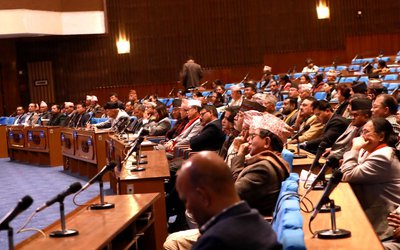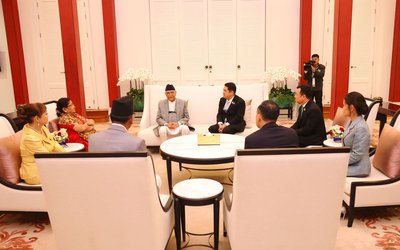More on News


At least 245 children have been intercepted from being trafficked and unnecessarily or illegally placed in children’s care homes since the first earthquake hit Nepal almost two months ago, said UNICEF.
The children’s organisation is collaborating with the Ministry of Women Children and Social Welfare and Child Welfare Board, as well as the Ministry of Home Affairs, the Nepal Police and the Department of Immigration to mitigate risk of trafficking through policy measures and direct response.
“UNICEF feared a surge in trafficking cases after the two earthquakes”, said Tomoo Hozumi, UNICEF Nepal Representative. “Loss of livelihoods and worsening living conditions may allow traffickers to easily convince parents to give their children up for what they are made to believe will be a better life. The traffickers promise education, meals and a better future. But the reality is that many of those children could end up being horrendously exploited and abused.”
Trafficking was rife in Nepal even before the 25 April earthquake, with an estimated 12,000 Nepalese children trafficked to India every year, according to a 2001 International Labour Organisation study. Girls not recruited into prostitution could be also sold as domestic slaves in India and other countries and boys taken into forced labour. After disasters such as earthquakes, there is a risk that trafficking will increase.
Families may also be more easily convinced to send their children to orphanages in Kathmandu and Pokhara, a trend that began following the civil war with promises of safety and education. Prior to the Nepal earthquake, approximately 15,000 children lived in child care homes in Nepal, and were potentially at risk of poorly-regulated adoption, exploitation and abuse. More than 85 per cent of these children had at least one living parent.
UNICEF has been working closely with the Government of Nepal and other partners to speed up and bolster the response on child trafficking prevention:
UNICEF is supporting the police to establish or strengthen 84 checkpoints and police stations throughout the country and the earthquake affected districts.
Maiti Nepal, a national NGO, is being supported by UNICEF to scale up or establish 12 screening and interception points along the India and China borders and create 11 transit centres for victims of trafficking. Shakti Samuha, another local organization, is receiving support from UNICEF to conduct surveillance and raise awareness in the 14 districts most affected by the earthquake.
UNICEF is supporting all relevant actors to confirm that all alleged cases of trafficked are verified and all children are accounted for through the strengthening of information management and coordination systems.
The Government suspended international adoption right after the 25 April quake and in early June also banned children from travelling between districts without parents or approved guardians. This measure was aimed at preventing children that may actually have living parents from unnecessarily being sent off for international adoption.
The registration of new orphanages has been suspended. The relocation of children out of their home districts is dependent upon prior authorization from the CCWB. All orphanages were banned from receiving new children without the prior knowledge and authorization of the Government.
The Indian Ministry of Home Affairs has issued an advisory to increase vigilance at border controls. Furthermore, Civil Society in India has been alerted to action to prevent and respond to trafficking.
UNICEF has spearheaded an awareness and public information campaign on child protection in Nepal following the earthquakes. To date, 40,000 flyers on prevention of family separation and trafficking have been distributed in all 14 affected districts, including to police stations, IDP camps, communities and local organisations.
25 airline companies operating in Nepal have been made aware of the need to screen passengers to ensure that children are accompanied by their legal care givers.
Radio Nepal is airing messages, reaching an estimated 70 per cent of the population, warning parents not to leave their children unguarded and to look out for suspicious people trying to talk to their children and/or to convince them to give their children up with promises of a better life.
UNICEF has supported the establishment of 141 child friendly spaces, reaching nearly 14,000 children, where girls and boys can safely recover from the emotional shock of the earthquake and where children at risk of separation and trafficking can be identified by the facilitators.
UNICEF’s temporary learning centres and school kits- distributed as part of the back to school campaign- not only minimise disruption to children’s education, but also protect them from exploitation and abuse, and provide them with messages to keep them safe and healthy.
UNICEF is also concerned about ‘Orphanage Voluntourism’ as families around the world have expressed a wish to help children in Nepal through adoption or orphanages visits.
“In some cases children are deliberately separated from their families and placed in orphanages so they can be used to attract adoptive families, fee-paying volunteers and donors,” said Mr Hozumi. “While many orphanage volunteers are well-intentioned they often are not aware that they could inadvertently cause harm to children. In addition, background checks are often not conducted on volunteers, which can increase the risk of child exploitation and sexual abuse.”
To raise awareness on the negative consequences of 'Orphanage Voluntourism’, UNICEF has been working closely with the tourism and volunteering sectors. 40 national and international agencies that recruit volunteers for orphanages in Nepal have been identified and encouraged to discontinue their orphanage volunteering programmes. Eight of them have already suspended their volunteering programmes in Nepal.
“To re-build damaged rural communities and keep families together is the best way to help children in Nepal recover from the earthquake,” Mr Hozumi concluded.

